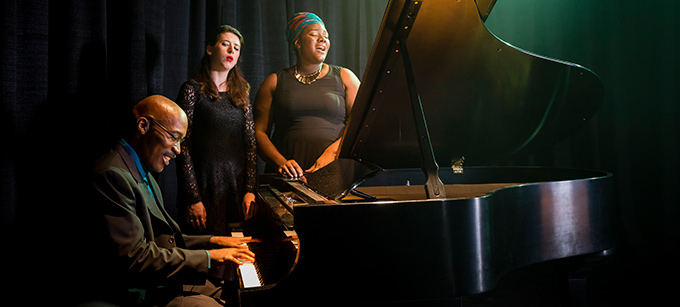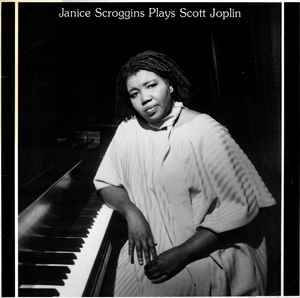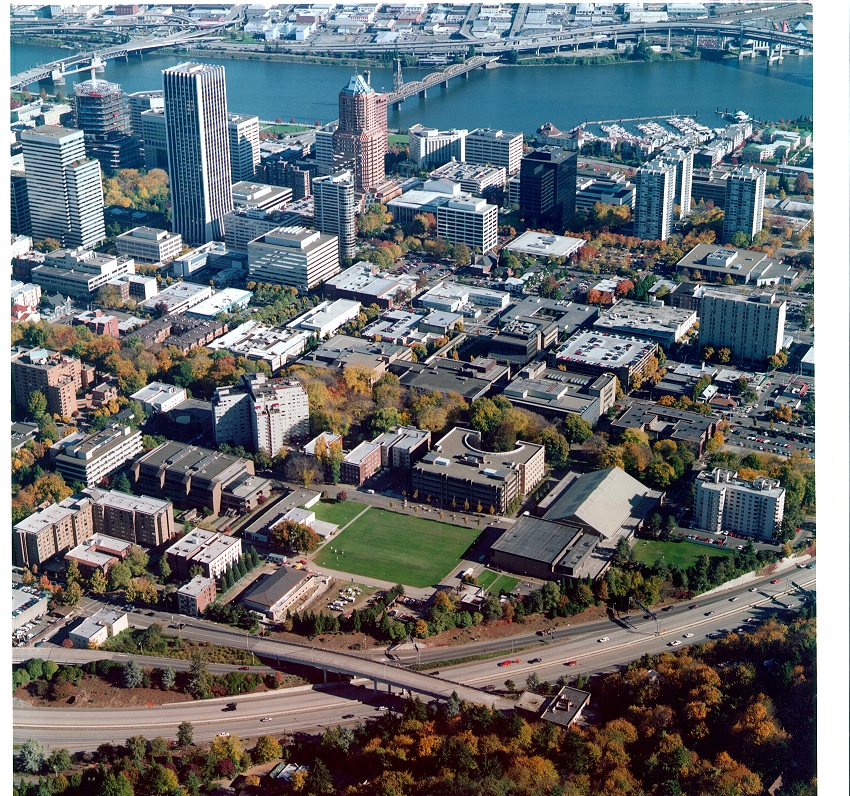A pianist, vocalist, composer, and educator, Darrell Grant arrived in Portland in 1997 with a national reputation. His contributions to the area jazz scene quickly elevated him to prominence based not only on his high level of musicianship but also on the attention and legitimacy he brought to jazz education and performance. Most notable has been his work on the Portland State University (PSU) music faculty, where he helped establish a major in jazz studies, founded the Leroy Vinnegar Jazz Institute, and managed LV’s Uptown, the university’s jazz club (2005–2008).
Grant partnered with the Portland Jazz Festival to bring his production, “The Incredible Journey of Jazz,” to area middle schools, and he set up an annual “Tribute to the Old Cats” concert, where student musicians play with jazz elders. He also produced albums by area musicians. Living and working in Portland has had a profound effect on Grant’s music, as Geoffrey Himes noted in 2000: “Far from smothering Grant’s ambition, . . . the Pacific Northwest seemed to liberate him from the conformist tyranny of Gotham’s retro-bop and allowed him to develop a more personal, more melodic style.”
Raised in Denver, Colorado, Grant studied both classical and jazz piano. He received a bachelor’s degree in applied classical piano from the Eastman School of Music and a master’s degree in jazz from the University of Miami in Coral Gables, Florida. In New York, beginning in 1986, Grant worked with a number of legendary jazz musicians, including drummers Roy Haynes and Tony Williams and vocalist Betty Carter. Verve-Forecast released his first CD in 1989, and he appeared on Greg Osby’s album, 3-D Lifestyles in 1993.
Grant’s 1994 album, The Black Art, was selected as one of the top ten jazz recordings of the year by the New York Times, and he released The New Bop in 1995 before moving to Portland. He has appeared on the BET program “Jazz Central” and on Marian McPartland’s “Piano Jazz” and “The World” on National Public Radio. His commissioned compositions include the anthem for the 1998 Nike World Masters Games and a Duke Ellington Tribute for the 1999 Mt. Hood Jazz Festival.
Grant moved west looking for a place where his music could have a greater impact. “I was looking for a sense of community,” he said, “a place where I could make a contribution and serve.” Borrowing the techniques of nonprofit arts groups, Grant created partnerships with business and community groups to support the albums he released on his label, Lair Hill Records. Revenues from his 1999 CD Smokin’ Java and his 2003 Spirit, for example, were contributed to and served as publicity campaigns for such organizations as Coffee Kids, the Oregon Children’s Museum, and the Oregon Trail Red Cross. His partners in the 2007 album, Truth and Reconciliation, included Mercy Corps, the youth-mentoring program P:ear, and Artists for the Arts. It is the responsibility of artists, he believes, “to communicate, inspire, provoke, inform and move others to transform society and themselves, and … to use this power to affect positive change in our communities and the world.”
Truth and Reconciliation, selected as one of the top ten jazz CDs of 2007 by critics in the Village Voice and JazzTimes, was inspired by South Africa’s struggle to end apartheid and build a new society. Grant brought together disparate styles in this music, uniting mainstream jazz, arrangements of pop tunes, and recorded speeches of Nelson Mandela and Martin Luther King. As he did on previous albums, Grant employed some of the nation’s best jazz musicians, including drummer Brian Blade, bassist John Patticucci, vibraphonist Joe Locke, and guitarist Bill Frissell.
Grant’s new work includes a program called “One O’Clock Jump,” in which he presents the songs of Nat King Cole and others of the 1950s, and he performs frequently in a duo with trumpeter Dimitri Matheny. In 2009, Grant debuted On the Territory, a group of young musicians dedicated to the proposition that an artist’s work reflects and comments on the place it springs from. He continues to perform in festivals and other settings in the United States, Europe, and Canada, remaining connected to the world while immersed in the local scene.
-
![]()
Darrell Grant on the piano.
Courtesy Portland State University
Related Entries
-
![Esperanza Spalding (1984-)]()
Esperanza Spalding (1984-)
Esperanza Spalding’s fierce talent in double bass and vocal work earned…
-
![Janice Scroggins (1955-2014)]()
Janice Scroggins (1955-2014)
It is unusual for musicians to achieve the respect of peers and profess…
-
![Portland State University]()
Portland State University
Located in downtown Portland, Portland State University is Oregon’s urb…
Map This on the Oregon History WayFinder
The Oregon History Wayfinder is an interactive map that identifies significant places, people, and events in Oregon history.
Further Reading
Bindert, Dan. "Darrell Grant: Making it happen on and off the stage." Fredereick Douglass Voice 61.3 (March 25, 1996): 19.
Darroch, Lynn. "Darrell Grant named to JSO Hall of Fame." Jazzscene (March 2008): 1.
Darroch, Lynn. "Darrell Grant: Bridging Genres, Bridging Rivers. 5/4 Magazine (April/May, 1997): 2.
Mason, Stewart, "Biography: Darrell Grant," AllAboutJazz. www.allaboutjazz.com/php/musician.php?id=7169.




